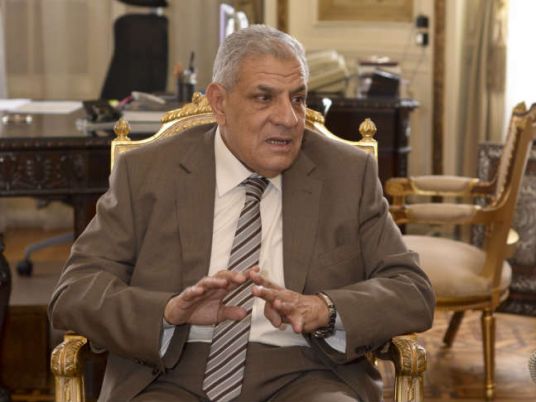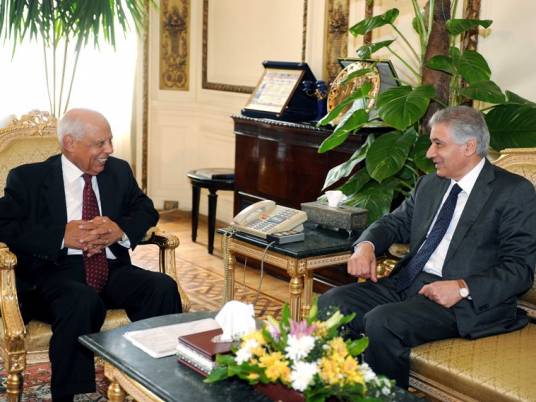The government will not raise taxes but will instead rely on foreign investment to remedy the country’s cash flow problem, Prime Minister Hesham Qandil said during a meeting with a group of foreign investors.
But with foreign investors yet to open their pockets, a growing government deficit, and pressure from negotiations with the International Monetary Fund, the government is looking for other ways to bring in more money.
The 2012/13 budget recently released by the Finance Ministry reflects this imperative. It targets a 15 percent increase in tax revenues for the 2012/13 fiscal year to maintain the budget deficit at 7.6 percent.
However, Finance Minister Momtaz al-Saeed recently admitted in a statement that the deficit for the 2011/12 year would be larger than planned, rising from LE134 to LE170 billion, or 11 percent of gross domestic product instead of 8.6 percent.
“The government underestimated its expenditures,” said Amr Adly, economic director at the Egyptian Initiative for Personal Rights. “You cannot significantly increase public wages and expect a moderate increase in budget spending in return.”
The ballooning deficit is also explained by under-achieving tax revenues; the government brought in roughly LE210 billion instead of the LE232 billion target.
“The government over-evaluated the growth rate, so they overestimated tax revenues as well,” said Samer Atallah, an economy professor at the American University of Cairo.
The 2012/13 budget targets a 3.4 percent budget deficit drop that would be financed by a 26.8 percent increase in tax revenues.
It’s just not realistic on such a tight schedule, Atallah and Adly say.
“Important changes in tax revenues are done on the medium term,” said Adly. “On the short term, the government has no other solution than decreasing its expenditures and borrowing money.”
Proven measures
Recent history has proved that significantly raising tax revenues can be done. Fiscal reforms of the 2004/2008 period led to anoverall 150 percent increase in tax revenues between 2004 and 2011 — a 17 percent average annual increase, according to Finance Ministry figures from the 2012/13 budget financial statement.
The income tax reform of 2005 was the central pillar of this major evolution. It implemented lower and more progressive taxation on wages, and established a 20 percent flat rate corporate tax.
By lowering rates, policymakers actually drew more people into the taxable fold, resulting in an overall increase in tax revenues.
Another major step was to make tax payment easier. The income and sales tax departments were unified in the Egyptian Tax Authority, and the number of payments was decreased. The World Bank estimated an average Egyptian company had to make 29 tax payments per year in 2011, as opposed to 42 in 2006.
New incentives
But in the current economic crisis, the effects of these reforms have diminished.
Authorities have desperately tried this year to improve revenues by providing strong incentives to paying taxes.
The government issued a law giving important discounts to people paying their deferred taxes this year. Those who paid their deferred or late taxes received a 25 percent discount if they paid before March 2012.
Electronic payment in banks has also been implemented to facilitate payment as well as reduce lines at public offices. Tax regulations have been simplified for small enterprises, which no longer have to report transactions if their yearly profit is less than LE1 million.
“Those are good ideas, but their effect won’t be immediate,” says Adly.
To boost the upcoming fiscal year revenues, the tax authority has recently announced the implementation of property tax starting from 1 January, the head of the Egyptian Tax Authority said earlier this month.
A progressive tax will be applied on people possessing properties whose value exceeds LE500,000. The Tax Authority expects the tax to yield between LE2 billion to LE3 billion.
However, the decree has yet to be issued.
“The government has to face the pressure from the high class that has invested a lot in real estate,” said Adly.
These measures are unlikely to lead to the LE56 billion revenue increase expected for next year.
“I would be very surprised if they could realize it,” said Atallah.
Room for improvement
Experts agree that Egypt’s current tax system leaves much room for improvement.
Despite the reforms of the 2000s, tax evasion remains widespread. Official figures estimate that only 20 percent of liable people pay their taxes.
Despite increased sanctions against tax evasion, a report from the OECD recommends more severity against tax evaders. The report also suggests more companies, and especially small enterprises, should be enlisted by the Tax Authority to make evasion more difficult.
“Institutional reform remains the most important task for the government,” said Atallah. “The tax bureaucracy has to become more efficient.”
Smuggling and customs fraud remain serious problems. Tobacco companies estimate that smuggled cigarettes represent 20 percent of the whole market, according to a report by Ahram Online.
And those problems, after a slack in security over the past year and a half, seem to be worsening. Saeed recently said Egypt had witnessed an unprecedented level of smuggling and tax evasion since the revolution and that the government was not able to impose control, according to a report by Daily News Egypt.
“Formalizing the economy will require decades,” said Adly. “It requires a long term plan as well as a global agreement with representatives of the informal sector.”
Most importantly, to take these steps, the government must have legitimacy.
“The government will first have to restore trust with the population,” says Adly.
Short-term fixes
Other less time-consuming options are also being debated.
The government is mulling a reform of sales tax year, according to a document obtained by Ahram Online in March. Sales tax already represents around 30 percent of all of the country’s tax revenues, according to a 2012 report by the Egyptian Center for Economic Studies.
But critics say it’s unfair to levy a tax across all income levels. The poor would pay like the rich, Atallah said.
“Is it the right moment to increase their tax burden?” he asked.
Indicative of its unpopularity, the sales tax measure has not been mentioned since President Mohamed Morsy arrived in office. Many say now is the time to ask for higher taxes on the rich, not the poor.
“It would generate higher revenues at a relatively low economical cost and generate social justice,” said Atallah.
Making the income tax more progressive is a first option.
The country’s income tax rate for high revenues is low compared to many countries, according to Atallah. An Egyptian who earns LE5,001 per year pays a 10 percent income tax, while a person earning more than LE10 million a year pays 25 percent, under the current law. Companies making under LE10 million per year pay a 20 percent flat rate, while those that make above that pay a 25 percent rate.
A revised property tax would also be a “step in the right direction,” according to Atallah, who also supports a tax on financial capital.
Former Finance Minister Samir Radwan tried last year to push for a tax on profits in the stock exchange and on acquisitions. He faced pressure from business lobbies and his idea was eventually been rejected by the military.
“Solutions exist, but it is a matter of political courage,” concludes Adly. “If the next majority in Parliament is social-minded, it will make the tax system more progressive. Otherwise, they will favor indirect taxes as they did under [former President Hosni] Mubarak.”



